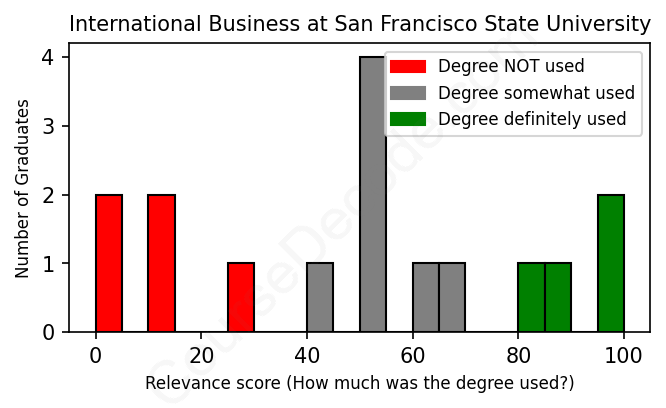
First, some facts. Of the International Business graduates from San Francisco State University we've analyzed , here's how many have used (or NOT used) their degree in their career:

These are estimates based on AI analysis of 16 LinkedIn profiles (see below).
The verdict? Significantly below average. Overall, with an average relevance score of 49%, International Business graduates from San Francisco State University have a much lower likelihood (-18%) of finding work in this field compared to the average graduate across all fields:
And for comparison, here's the chart for all profiles we've looked at across all degrees.
Also, after graduating, only 6% of these graduates have pursued further education other than another Bachelor's degree (such as a Masters degree or other), compared to the average across all profiles of 35%. This suggests a Bachelors degree is enough for most International Business graduates, and it's normal to look for work straight after graduation.
See the details:
|
Relevance score: 11% We think this person has NOT gone into a career related to their degree. We think this person has NOT gone into a career related to their degree.
DEGREE INFOGraduated in 2018 from San Francisco State University with a Bachelor of Business Administration - BS in International Business. No other secondary education since. JOB HISTORY SINCE GRADUATIONBusiness Development Manager, Europe Persona Global, Inc Jan 2018 - Apr 2019 Infantry Basic Officer Leadership Course  US Army Nov 2019 - Jun 2020 Assistant Operations Officer  1st Stryker Brigade Combat Team, 25th Infantry Division Mar 2021 - Sep 2021 Platoon Leader  11th Airborne Division, U.S. Army Sep 2021 - Sep 2022 Executive Officer  11th Airborne Division, U.S. Army Sep 2022 - Jun 2023 Executive Officer  U.S. Army Recruiting Command (USAREC) Jun 2023 - Apr 2024 Company Commander  U.S. Army Recruiting Command (USAREC) Apr 2024 - Present ABOUTNo information provided. |
The top 10 most common jobs done by the graduates we've analyzed (ranked most common to least) are:
When looking at the career paths of graduates from San Francisco State University's International Business program, there are a few common themes. Many grads have ventured into roles in finance, banking, or marketing, where they utilize at least some of the skills learned during their studies. For instance, positions like Personal Banker or Marketing Manager often require knowledge of international market dynamics, making them directly relevant to their degree. On the other hand, there's also a noticeable trend of graduates taking jobs that seem completely unrelated to International Business, such as teachers or real estate agents. These roles may rely on general business skills but don’t really tap into the international aspect of their education.
Overall, while some graduates have successfully found positions that align well with their International Business degree, like roles in finance or strategic positions within various companies, many others have ended up in fields that aren’t directly applicable. It's a mixed bag. Some jobs offer a solid reflection of their academic background, while others appear to sidestep the core principles of International Business altogether, meaning that a degree doesn’t always guarantee a career in that specific field. This variety can be both a strength and a bit of a concern for prospective students considering their futures in the global job market.
Here is a visual representation of the most common words in job titles for International Business graduates (this is across all International Business graduates we've analyzed, not just those who went to San Francisco State University):

Graduates from the International Business program at San Francisco State University seem to have a mixed bag when it comes to their career trajectories. It looks like many of them start off in roles that are quite relevant to their degree, often finding their first jobs in banking, marketing, or operations. For example, recent grads have taken on roles like Sales Operations Specialist, Operations Manager, and Business Development Manager. These positions reflect a solid foundation for those who want to scale their careers in international business and corporate environments right after graduation.
Fast forward 5 to 10 years down the line, and many of these alumni appear to have progressed into managerial or specialized positions, although the pathways can vary significantly. Some have climbed the corporate ladder in companies like Toyota and Stilt, while others have taken entrepreneurial leaps, starting their own firms or becoming influential figures in niche markets, like cryptocurrency marketing. However, not everyone seems to have stayed strictly on the international business track; some have veered into areas like real estate or teaching, suggesting that while the degree provides a solid foundation, graduates may explore diverse paths depending on their interests and opportunities that arise. Overall, it looks like there's a promising mix of success stories and more wandering career paths, which is pretty typical for this type of degree.
Honestly, a Bachelor’s degree in International Business at San Francisco State University is pretty manageable, especially if you're passionate about the subject. You'll definitely have your share of challenging classes, like economics and finance, but many students find that the coursework is designed to be engaging and practical. The workload can be a bit heavier than average at times, with group projects and presentations, but if you stay organized and keep up with your studies, it's definitely doable. Plus, being in a vibrant city like San Francisco adds an exciting dimension to learning about global business issues. Overall, it's not the easiest degree out there, but if you put in the effort and stay interested, it can be a rewarding experience!
Most commonly, in the LinkedIn profiles we've looked at, it takes people 3 years to finish a Bachelor degree in International Business.
Looking at the career paths of these San Francisco State University international business grads, it seems like they’re doing pretty well for themselves overall. Some have landed solid roles in finance and tech, like the Private Client Banker at JP Morgan and the HR Coordinator at Toyota Research Institute, which typically pay well. Others are flexing their entrepreneurial muscles, starting businesses or taking on leadership roles in marketing and operations, which can definitely lead to good earnings if things go well. Even those in more traditional jobs, like teaching or general management, have potential for decent salaries, especially as they gain more experience. So yeah, it looks like most of these folks have found ways to make decent money, though it obviously varies based on their specific paths and choices!
Here is a visual representation of the most common words seen in the "about" section of LinkedIn profiles who have a Bachelor degree in International Business (this is across all International Business graduates we've analyzed, not just those who went to San Francisco State University). This may or may not be useful:

Here are all colleges offering a Bachelor degree in International Business (ordered by the average relevance score of their International Business graduates, best to worst) where we have analyzed at least 10 of their graduates:
| College | Score | Count |
|---|---|---|
 Florida International University - College of Business Florida International University - College of Business
|
67 | 13 |
 Berkeley College Berkeley College
|
62 | 11 |
 Rollins College Rollins College
|
61 | 10 |
 University of North Florida University of North Florida
|
59 | 10 |
 University of California San Diego University of California San Diego
|
59 | 10 |
 The University of Texas at San Antonio The University of Texas at San Antonio
|
55 | 10 |
 Florida International University Florida International University
|
54 | 32 |
 San Francisco State University San Francisco State University
|
49 | 16 |
 The University of Memphis The University of Memphis
|
49 | 10 |